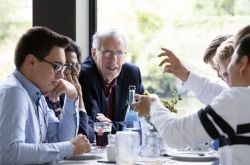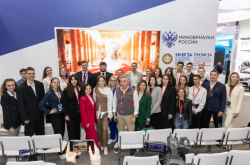Have you been to St. Petersburg before?
This is my first time in Russia and St. Petersburg. I’m in love with this city, it’s really beautiful. A professor from ITMO University met me at the airport and showed me around the city. Even though I have lectures every day, I still find time to see the sights, walk around and deal with work matters. Everyone is very welcoming and friendly, and the students are keen to talk. I’m glad I came here.
This is your first time teaching at ITMO University or Russia as a whole. Tell us about your practice of giving lectures abroad. Where have you already gone on this trip?
I travel around Europe a lot and give lectures at the different universities there; I also come to Asia often. I’m from Iran myself. I started teaching at University of Memphis 35 years ago, after getting my PhD. I enjoy study and research, but I only teach two courses a year, for Master’s and PhD students. I wasn’t used to giving several-hour lectures on a daily basis, so I’ve even lost my voice a bit here. This is my first time in Russia, and I’m glad to see that the students are interested. There are language barriers at times; on my first day, a few students came up to me who were having a harder time than others because I demanded from them the same kind of response I ask from other students of mine. In my later lectures, I turned my attention more often to cases, which made it easier for students to learn things. In my teaching, I put an emphasis on interaction, and students have to present cases, too. There are two reasons for this: first, I have to make sure that they pay enough attention to the material, and second, they need to develop their communication skills. That’s why it’s important not only to listen, but to talk as well, which is what I ask of students. I also ask them to monitor the development of their communicative writing skills. It’s important to pay attention to these things.

What made you decide to bring your course to ITMO University?
I was a keynote speaker at a conference in Shanghai. After my talk, a member of the audience came up to speak to me. He was an American working as a tutor in China, and we talked about my work and the lectures I give in various countries. He asked if I’d ever been to Russia, mentioned ITMO University and helped me get in touch with the university. Thanks to networking, I ended up here.
What qualities did you notice in Russian students while you taught the course?
The one thing I’ve learned about Russian students is that they, just like all other students, are eager to learn. And if you respect them and make it easier for them to learn, they’ll respond in kind. Sometimes I’ll ask them if they understood everything I said; when I hear a wrong answer, I don’t tell them they’re wrong, but instead try to find the truth through discussion. I try to get students as involved in the educational process as possible, because they might not all have a good grasp of English, but they still need to comprehend the course material. The only difference for me was that I had to speak slower and clearly, as English is not a native language here.
One day, we discussed professional ethics; as part of that topic, we worked on several cases and I shared my own experience that I acquired when as a consultant for various companies. When I draw from my own experience, I try to help the students understand the existing ethical culture between companies. My course contains three important topics. The first is the sustainable development of business, which is becoming a common practice everywhere and especially in Europe and Asia. In order to make their product viable, companies have to not only monitor their financial performance, but also to think about the environment, protect it and be aware of their social responsibilities to the society and government. In the course, I also put emphasis on corporate management, which helps companies be effective and identify the key players (investors, managers, and so on). I try to cover the topics that, I think, are of the most interest to students, and provide them with the kind of information that they won’t get from other sources.

How much do you think knowledge of professional ethics determines someone’s success in the modern world? Even today we still witness major companies being far from ethical, leading to scandals and damage to their reputations.
As you understand, all ethics are based on moral principles, like, for instance, family values of religious views. These views differ greatly from nation to nation, but when we’re talking about the global economy, professional ethics and business ethics are the key factor since they determine your reputation. Today, social media and the like propagate information in mere seconds, and companies’ ethics are on full display. Business ethics is a culture of ethical behavior, of trust and reputation, and all these things are undoubtedly crucial for companies.
Why is important to talk about sustainable business development, corporate management and professional ethics all within the confines of one course?
These three topics are what I teach Master’s and PhD students back in Memphis. Here, I teach 15 lectures over the course of which I try to give the students a fundamental understanding of all three. Practice shows that these topics are of interest to all students of business processes. Any entrepreneur should be well familiar with these topics regardless of where they work, be it Russia, China or the USA. I try to form a complex picture of business and how it can be studied, which is why these three subjects are at the center of it all. Another advantage is that students of any field of study (management, IT, economics, etc.) will find something useful, as I try not to speak too much on the technical aspects.

You’ve published 12 books, most of them focusing on corporate management. Is your course based on the research you wrote about in those books?
Two of my books are about sustainable business, and the lectures dedicated to that subject are indeed based on those works. In the same way, my lectures on professional ethics and corporate management are based on what I’d written before in my books, as well as on the criminal database I referred to in one of my recent works, which has also become a very useful resource for business students. This has to do with studying the various cases of fraud in our subject area. I also talk about the various global events like financial crises and scandals.
What is the main focus of your course? What should the students take away from it?
I want students to walk away having learned about the role of business in society. It’s important to me that they understand the responsibility that boards of directors and manufacturers have to provide investors with relevant, up-to-date information. Today, more than half of all Americans invest in the stock market. For instance, I invest in stocks as a way of securing my retirement and my kids’ education, and stock prices are dependent on corporate efficiency: when it goes up, so do the prices. Efficiency, in turn, depends on ethical behavior and management. If management provides high-quality financial information, investors make correct, profitable decisions. What happens when they do that? The stock market is more effective, and the nation grows and prospers. In the context of today’s globalization, when one nation is winning, others, too, can benefit from that – that is the big picture I want my students to see.

Is the course you tour the world with a part of your program in Memphis or did you develop it specifically for these lecture visits?
I created this course ten years ago for the students of an MBA program. Ever since I wrote my first book, I try to update the course with all the new things I encounter. Everything the course includes is relevant for any business there is.
Have you noticed any major change in any of the three areas in the past decade?
The biggest change is technological. Technology has a great influence on any business, and I see that its role keeps becoming bigger. Look at blockchain and how businesses are starting to use it. Electronic commerce affects social media, which, in turn, affects everything else. Bitcoin is yet another innovation that has changed the world. Indeed, the biggest changes are all related to the rapid development of technology.
Do you plan to come to Russia again, perhaps to give your lectures at some other universities?
That’s a key objective for me. I usually bring my course to one university to give it exposure, and then get invited to that country’s other universities. Networking is becoming a key factor in deciding on the next destination. For instance, one of my new Russian acquaintances may help the laws of networking lead me to other places and I’ll be glad to go there and work with the students. If ITMO University invites me back, I will gladly return.




